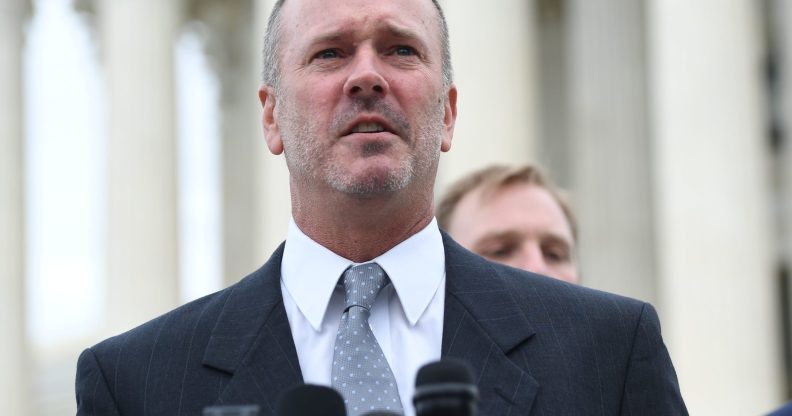Gerald Bostock finally handed settlement after SCOTUS win that changed LGBTQ+ rights forever

Gerald Bostock speaks to demonstrators in favour of LGBTQ+ rights at a rally outside the US Supreme Court in 2019. (AFP via Getty/ SAUL LOEB)
Gerald Bostock, who helped secure employment protections for queer people across America in a landmark Supreme Court case, has finally received his settlement.
Bostock was the plaintiff in the historic 2020 Supreme Court case Bostock v Clayton County.
He was an employee of Clayton County, Georgia, working as an official for the juvenile court system, when he was fired in early 2013 after joining a gay softball league for “conduct unbecoming a county employee”.
Though there was no legislation at the time to protect him from anti-LGBTQ+ discrimination in employment, Bostock was determined to fight his case.
Finally, after a seven-year legal battle, the US Supreme Court ruled that existing provisions under the 1964 Civil Rights Act, which outlaw discrimination based on sex, also apply to cases where “an employer fires an individual merely for being gay or transgender”.
The landmark ruling, which also considered the discrimination cases of Aimee Stephens and Donald Zarda, extended employment discrimination protections to LGBTQ+ people across the United States.
While the decision was a huge win for LGBTQ+ rights in America, Bostock’s fight wasn’t quite finished, as his case was sent back to the lower courts to determine his settlement.
On Friday (4 November), the Clayton County Board of Commissioners finally approved a $825,000 settlement.
According to ABC News, Bostock said at a news conference after his settlement was announced: “I’m filled with joy and words can hardly express how happy I am that this is now over.
“As I said from the beginning, no one should go to work fearful of losing their job because of who they are, who they love or how they identify.”
Bostock’s attorney Tom Mew added: “For a case that started out about what happened to Gerald the individual and us trying to make that right, it certainly became much bigger than that.”

